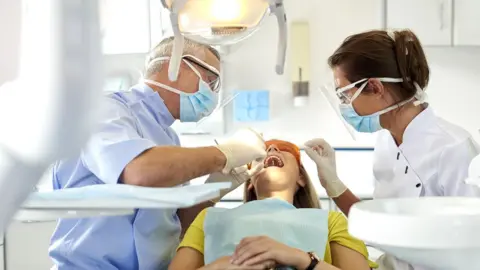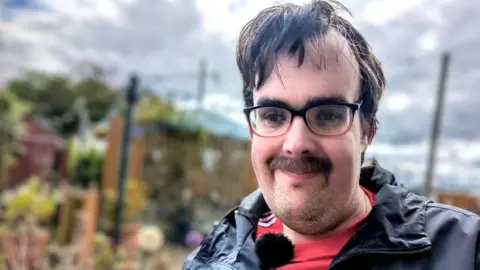Dentists carry out 28% fewer treatments in Scotland than before Covid
 Getty Images
Getty ImagesDentists in Scotland carried out 28% fewer treatments than before the pandemic, new figures have shown.
A Public Health Scotland report found 757,000 procedures took place in February 2022, compared with more than one million in February 2020.
It also revealed that people from more deprived areas were less likely to go to a dentist than those who were better off.
Dental leaders said they were facing an enormous backlog.
The Scottish government said it was committed to tackling the issues and it had introduced payments to support dentists to see more patients.
Why has this happened?
Dentists were forced to close across Scotland when the first lockdown started in March, 2020.
This is because dental surgeries had the potential to be a place where Covid could have spread easily - as dentists need to get very close to their patients who sit for long periods of time with their mouths wide open.
Although more than 70 Urgent Dental Care Centres were set up for emergency cases, the number of treatments being carried out plummeted to just over 8,000 in May that year.
Since then, practices have been able to offer more treatments as restrictions relaxed, but it is only since the start of this month that they have been allowed to reduce their infection control measures in line with the national guidance.
With the rules around cleaning between patients reduced, they can now see more people in the same amount of time.

'I would phone, phone, phone'

William Hendren from Ayr phoned his dentist regularly throughout 2020 and 2021 because of pain in his gums. But the pandemic meant he couldn't get an appointment until April this year.
"Whenever I could I would phone, phone, phone," said William. "Phone back in July, phone back in August, in September and October.
"I appreciate how difficult and how serious Covid-19 has been but things need to get back to normality. If it keeps going like this, then God knows what will happen."

Public Health Scotland data showed the poorest in Scotland were attending at a lower rate than their more affluent counterparts, as well as at less than half the rate seen before the onset of Covid.
The average monthly attendance at primary care dental services in the year to January 2020 was 7.5% in the most deprived areas. From December 2021 to February this year, that figure fell to 3.4%.
In comparison, 9.4% of people living in the most affluent areas attended dental services before the pandemic, and 4.6% in the most recent three-month period.
'Cliff-edge for practices'
The Scottish government said that access to dental appointments had increased as Scotland's Covid restrictions eased.
A spokesman said: "These measures were vital to protecting staff and patients during the unprecedented public health crisis and we are now seeing practices able to see more patients.
"A new system of interim support payments that came in this month will support dentists to see more patients while avoiding a cliff-edge for practices during what is still a difficult period for dental teams.
"From 1 April infection prevention and controls (IPC) were relaxed, with it now at the discretion of dental teams whether they wish to use full IPC protection or ordinary PPE.
"We're confident that these revised payment arrangements and the relaxation in IPC Guidance are substantial steps in the right direction."


The pandemic backlog is not the whole story behind people struggling to access routine dental care.
Like other parts of the health service there are workforce challenges, dental nurses are in short supply and an entire year of graduate dentists has been lost as they were unable to complete their training due to Covid.
Practices are getting bigger, owners are increasingly business people who look to things like cosmetic dentistry to drive up profits. Dentistry has always been a mixed economy of private and NHS patients. But there is less incentive to increase NHS numbers for lower returns.
The Scottish government says it wants free access to dental care for everyone in Scotland and in the short term is providing additional funding to dentists to help with the backlog.
But many worry about the long-term future of dentistry, believing it in need of more than a routine check-up.
